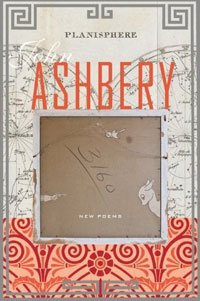John Ashbery Turns 25

John Ashbery is not one of my favorite poets, but his longevity and prodigious accomplishments put him in that newly minted category of the “too big to fail.”
Having won countless major awards (Pulitzer Prize, the National Book Award, the Yale Younger Poets Prize, National Book Critics Circle Award, etc.), including the lottery for which all artists wish, the MacArthur Foundation fellowship—though never selected as the U.S. Poet Laureate (he was poet laureate of the State of New York)—Ashbery seems to have risen to a level of critical immunity. His new collection Planisphere: New Poems (Ecco), his 25th, pretty much offers the same kind of poem Ashbery has been writing for 50 years. Some commentators assert his poems are essentially about poetry. Ashbery himself says:
“I don’t find any direct statements in life. My poetry imitates or reproduces the way knowledge or awareness come to me, which is by fits and starts and by indirection. I don’t think poetry arranged in neat patterns would reflect that situation. My poetry is disjunct, but then so is life.”
What I do find attractive about Ashbery’s poetry is his Whitmanesque inclusion of the reader and his manifold sources: movie titles, street slang, conversational fragments, and more, and that all-important ingredient humor—sometimes of the self-effacing sort:
“I’m quite puzzled by my work too, along with a lot of other people. I was always intrigued by it, but at the same time a little apprehensive and sort of embarrassed about annoying the same critics who are always annoyed by my work. I’m kind of sorry that I cause so much grief.”
The following poem comes from Planisphere:
Breathlike
